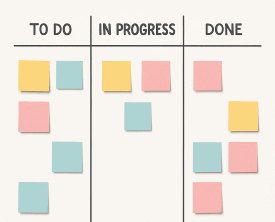3 Main Levels of Staff Scheduling Explained
By Mark Ballance, Resource Scheduling Specialist at Schedule it Ltd since 2010.
 When it comes to managing human resources and scheduling staff members – your organisation has a few different options.
When it comes to managing human resources and scheduling staff members – your organisation has a few different options.In this post, we examine the 3 most popular methods of staff scheduling and their benefits or pitfalls: traditional, manual/paper based scheduling systems, digital systems using multiple platforms and software packages, and dedicated staff scheduling software.
Comparing them in terms of effectiveness, efficiency and value for money – we look at why, as we head into 2018, there’s only one sensible solution for forward-thinking businesses.
Manual Planning
Many businesses still rely entirely on manual scheduling systems – usually a combination of multiple paper diaries, shared whiteboards, notes and calendars.
These systems usually develop over time, out of necessity, or are often used by organisations that started small then started taking on staff. Whilst simple manual systems are fine when an organisation is one or two people strong, they simply aren’t fit for purpose when it comes to larger businesses.
As an organisation grows, manual, paper-based systems soon show their weakness. With no centralised control, limited group visibility and multiple systems in place - organisations can quickly fall into ‘organised chaos’.
Because sharing and communicating information is so difficult, it takes a lot of effort and resource to manage manual systems. It’s really easy to lose track, with the inevitable consequence being that mistakes are made, resources are double booked, meetings get missed and business efficiency takes a hit.
Digital – Multi-Platform
In 2017, the vast majority of businesses rely on digital staff scheduling to some degree. Most businesses utilise a hybrid, in-house system which includes multiple different components, including shared calendars, group emails, simple diary software and spreadsheets – usually covering several different platforms and software ecosystems.
These systems are a big step up from manual systems in terms both control and visibility - but also have downsides. Utilising multiple systems often leads to errors and communication problems, as different team members struggle to input or share information across all aspects of the scheduling system.
A single mistake, or piece of information that isn’t shared can have serious knock-on effects throughout the system.
In most cases, multi-platform systems require management, from either an individual or a team of gatekeepers – and don’t provide uniform shared access. This doesn’t just eat up business resources that could be better deployed elsewhere – it also limits control to a few individuals. This lack of flexibility can make it difficult for all team members to react when changes need to be made.
Any system that uses multiple different components and pieces of software is a compromise, that can never be 100% efficient.
Dedicated Staff Scheduling Software
Modern scheduling software, like Schedule It, brings everything together in one place in an effective, efficient and easy to use platform – connecting an organisation, and providing complete visibility and control over the entire staff scheduling process.
By integrating and sharing information seamlessly across different platforms and ecosystems, it brings organisations together, without forcing everyone in an organisation to work in exactly the same way.
It improves and automates organisation, helping to minimise mistakes – cutting the time, effort and resources associated with staff scheduling. It will also automatically notify team members of changes, improving efficiency and communication.
Ultimately, dedicated staff scheduling software will free up time and resources, whilst improving profitability, efficiency and profitability.
Better staff scheduling for your business with Schedule It
Used effectively, Schedule It can transform the way your organisation works - removing the chaos, time and effort from your scheduling, so that everything runs smoothly.
Take a look at our full list of features, and take the first steps towards eliminating time-wasting in your organisation today!
Try Schedule it Free
No credit card required. Capterra/G2











